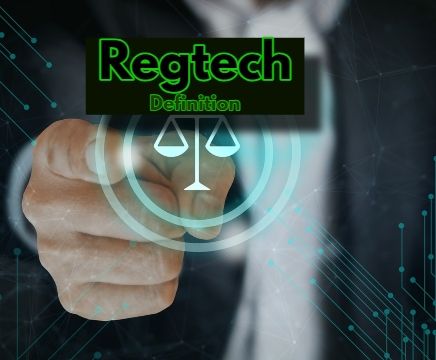Regtech (« Regulatory – Technology ») – definition. What do we mean when we talk about regtech companies?
Regtech – definition: This contraction, regtech is used to identify one of the key businesses in the Fintech ecosystem, namely: offering services to the banking industry relying on innovative technologies such as artificial intelligence, Big Data or the Cloud. The aim is to help them comply with the numerous regulations in their sector.
Want to find out more?
Regtech – definition and pratical application:
Regtech – definition: Regtech is a contraction of « regulatory technology », which refers to the use of technology to help businesses comply with regulations and regulatory requirements in various sectors, including finance, healthcare, environmental compliance, etc.
Businesses are often faced with a complex and ever-changing regulatory landscape, making compliance difficult and costly.
Regtech solutions use technologies such as artificial intelligence, process automation, data analytics, blockchain and other tools to help businesses manage regulatory requirements more effectively.
Regtech applications include monitoring financial transactions to detect fraud or money laundering, managing compliance with tax laws, protecting personal data in line with privacy regulations, and much more.
By simplifying and automating compliance processes, regtech solutions enable companies to reduce risk, improve operational efficiency and more easily comply with current rules and regulations.
Some concrete applications of regtech technology in various fields include:
Financial compliance :
- Transaction monitoring: Using artificial intelligence and machine learning to analyze financial transactions and detect suspicious activities such as money laundering.
- Risk management: Platforms using sophisticated algorithms to assess financial risks and ensure compliance with regulatory standards.
Healthcare sector:
- Data protection and HIPAA compliance: regtech solutions to ensure compliance with stringent medical data privacy regulations, such as the Health Insurance Portability and Accountability Act (HIPAA) in the USA.
- Clinical trial monitoring: Use of technologies to monitor and ensure compliance with clinical trial protocols, while respecting regulations.
Environmental compliance:
- Monitoring and reporting: regtech platforms to monitor emissions, track compliance with environmental standards and produce reports that comply with environmental regulations.
Banking and fintech: - Identity verification: Use of biometric and AI technologies to verify customer identity in compliance with KYC (Know Your Customer) regulations.
Banking and fintech:
- Identity verification: Use of biometric and AI technologies to verify customer identity in compliance with KYC (Know Your Customer) regulations.
- Tax compliance: regtech solutions to automate and ensure compliance with tax requirements.
Insurance:
- Risk assessment: Using data analytics and AI to assess risk and calculate insurance premiums in line with regulations.
Real Estate:
- Anti-money laundering compliance: Using technologies to detect and prevent money laundering in real estate transactions in line with regulations.
These regtech applications all aim to facilitate regulatory compliance by using innovative technologies to automate, monitor and simplify processes so that companies can comply more effectively with the rules and regulations that affect them.
Examples of regtech companies:
Some Regtech companies are pioneers in the field of regulatory compliance, offering a range of technology solutions to help companies comply with regulations. Here are just a few examples:
Compliance.ai: This platform uses artificial intelligence to track, analyze and provide updates on ever-changing regulations and laws across different sectors.
IdentityMind: Specializing in identity verification and regulatory compliance for companies operating in the financial services, fintech and crypto-currency sectors.
Trulioo: An identity verification company that uses global data and advanced technologies to help companies verify customer identities while complying with KYC and AML regulations.
Behavox: Focuses on monitoring and analyzing employee behavior in financial firms, using AI to detect suspicious activity and ensure regulatory compliance.
ClauseMatch: Offers a regulatory compliance management platform, enabling financial institutions to track and manage their regulatory obligations.
Onfido: Offers identity verification and anti-fraud solutions that use AI to help companies comply with KYC and AML regulations.
Encompass: Provides an automated compliance verification platform for financial companies, enabling faster and more accurate verification of customers and business partners.
AQMetrics: Specializes in risk management and regulatory compliance for financial services companies, using technology to automate compliance processes.
These regtech companies represent a cross-section of the diversity of technology solutions available in the regulatory compliance space, using innovations such as artificial intelligence, machine learning and blockchain to help businesses meet regulatory requirements more effectively and efficiently.
What is the likely future for this industry?
The future of Regtech is bright, and should continue to evolve significantly to meet the growing regulatory compliance challenges facing businesses. Here are some perspectives on the future of Regtech:
- Expansion of specialized solutions: We can expect to see growth in the diversity and specialization of Regtech solutions to meet specific needs in different sectors and regions of the world. Companies could see the emergence of even more targeted technologies tailored to their specific regulatory requirements.
- Increased adoption of AI and automation: The adoption of artificial intelligence, machine learning and automation is likely to increase. These technologies enable more sophisticated data analysis, more accurate risk detection and automation of compliance processes.
- Use of blockchain: Blockchain technology could play an important role in Regtech, particularly in verifying identities, managing data and ensuring compliance thanks to its security and traceability capabilities.
- Collaboration with regulators: Regtech companies could look to work more closely with regulators to better understand regulatory requirements and develop tailored solutions that simplify compliance while meeting standards.
- Expansion into new sectors: While Regtech began in the financial sectors, it is expected to expand into other industries such as healthcare, real estate, insurance and even government sectors, where regulatory requirements are equally stringent.
- Focus on user experience: Regtech solutions are likely to place greater emphasis on user experience, making compliance processes more user-friendly and accessible, thus facilitating the adoption of these technologies by businesses.
- Internationalization and standardization: With a globalized economy, Regtech solutions will have to adapt to meet multiple and diverse regulations on an international scale. Standardization of processes and tools could become a major objective to simplify compliance across borders.
Regtech – definition in relation to DeFi:
If you follow the news in decentralized finance, you’ll have noticed that DeFi-related projects are increasingly concerned by regtech. Indeed, technological innovation will continue to play a key role in transforming regulatory compliance, offering more efficient and agile ways of meeting standards for all financial players, including decentralized finance.
It’s important to note that the decentralized nature of DeFi can make regulatory compliance more complex, as some DeFi protocols can operate without direct central control, sometimes making it difficult to enforce traditional regulatory rules.
It also makes the work of Regtech companies in the DeFi space trickier, as they have to find innovative ways of monitoring and ensuring compliance while respecting the principles of decentralization and autonomy.
In sum, while Regtech has a potential role to play in enforcing regulatory standards in the DeFi, adapting it to this emerging space remains a challenge due to the innovative and decentralized nature of decentralized finance.

